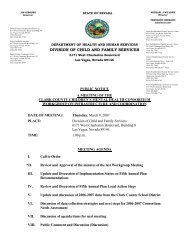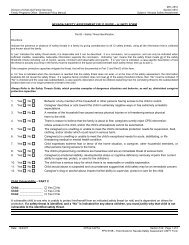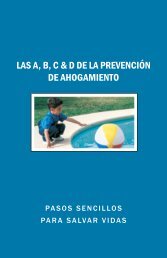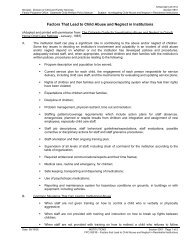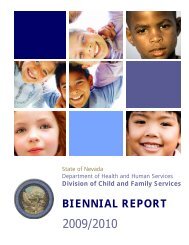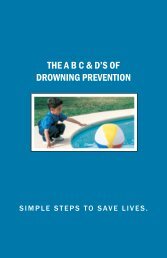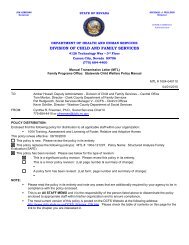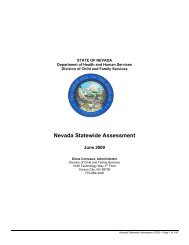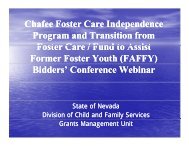STATE OF NEVADA - Division of Child and Family Services
STATE OF NEVADA - Division of Child and Family Services
STATE OF NEVADA - Division of Child and Family Services
You also want an ePaper? Increase the reach of your titles
YUMPU automatically turns print PDFs into web optimized ePapers that Google loves.
Results <strong>of</strong> the study identified several areas <strong>of</strong> policy that needed clarification or further<br />
specification. Areas <strong>of</strong> concern included: assessment <strong>of</strong> present <strong>and</strong> impending danger was not<br />
being well delineated in policy or practice, limited demonstration <strong>of</strong> the concept <strong>and</strong> a working<br />
knowledge <strong>of</strong> caregiver protective capacities, a lack <strong>of</strong> underst<strong>and</strong>ing <strong>of</strong> how safety intervention<br />
analysis should be applied <strong>and</strong> how safety threats need to be managed in the least restrictive<br />
environment possible, <strong>and</strong> a lack <strong>of</strong> supervisory oversight <strong>and</strong> accountability for quality<br />
documentation <strong>of</strong> the NIA <strong>and</strong> Safety Assessments.<br />
In response to the case review results, a request for Technical Assistance (TA) with the National<br />
Resource Center for <strong>Child</strong> Protective <strong>Services</strong> (NRCCPS) was submitted <strong>and</strong> approved. TA will<br />
assist in policy <strong>and</strong> tool redesign to ensure documentation fits <strong>and</strong> supports practice, capacity<br />
building begins in Nevada by developing purveyors who are experts in the safety practice model,<br />
<strong>and</strong> development <strong>of</strong> a long-range strategic plan which seeks to evolve practice <strong>and</strong> decision<br />
making with special emphasis on safety management <strong>and</strong> intervention in ongoing/permanency<br />
cases. In March 2008, DCFS began working with the NRCCPS <strong>and</strong> the statewide NIA/safety<br />
workgroup on necessary revisions to policy <strong>and</strong> assessment tools to address the areas <strong>of</strong> concern<br />
that were identified in the September 2008 case review. A revised NIA/safety assessment tool is<br />
currently in development. Once approved, final revisions to policies, assessment tools, <strong>and</strong><br />
UNITY will begin.<br />
In response to the Panel’s feedback on the targeted review <strong>of</strong> Risk Assessments, training <strong>of</strong> CPS<br />
caseworkers occurred in December 2007, prior to implementation <strong>of</strong> the Risk Assessment tool.<br />
Risk assessment training is currently encompassed in the new worker CORE training. It is our<br />
expectation that additional training with supervisors <strong>and</strong> investigators slated to occur over the<br />
next year will address the lack <strong>of</strong> information collection concern raised by the Panel. The<br />
Panel’s findings related to the automatic tallying <strong>of</strong> Risk scores will need to be explored with<br />
DCFS Information Management <strong>Services</strong> (IMS).<br />
Recommendation 4: CPS caseworkers should receive additional training on identifying child<br />
<strong>and</strong> family needs related to mental health disorders, developmental disabilities, <strong>and</strong> substance<br />
abuse disorders, <strong>and</strong> then referring <strong>and</strong> actively linking children <strong>and</strong> families to needed services.<br />
DCFS Response: The newly developed New <strong>Child</strong> Welfare Worker CORE Training includes a<br />
Module on assessment that emphasizes the need to be observant <strong>of</strong> functionality concerns that<br />
may indicate an underlying problem such as mental illness, developmental disabilities, or<br />
substance abuse, which may have an effect on the parent’s child-rearing skills. However, this<br />
does not cover the diagnosis <strong>of</strong> such issues. The emphasis is on reporting the specific functional<br />
levels <strong>and</strong> not just reporting problems or behaviors. There is also an emphasis on record<br />
collection. When child or parent functioning is in question, new workers are encouraged to refer<br />
parents to the appropriate resource for screening. New Worker CORE Training <strong>of</strong>ficially rolled<br />
out in January <strong>of</strong> 2009. New workers are the first priority. However, the training will soon be<br />
open to all workers <strong>and</strong> other multidisciplinary team members such as law enforcement, CASA,<br />
judges etc. who want to attend. It is important to note that workers are strongly encouraged to<br />
speak with collateral contacts during the investigation, in order to obtain a complete picture <strong>of</strong><br />
child <strong>and</strong> parent functioning <strong>and</strong> link families to the necessary services.<br />
CRP ANNUAL REPORT 2009 16



